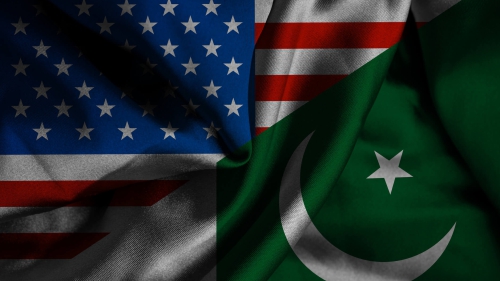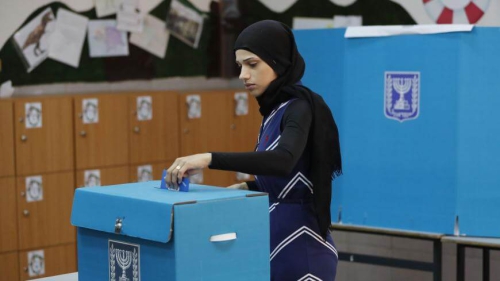A Roller Coaster Ride for Bush
 |
For the second time in his short presidency, George W. Bush has reversed a downward slump in the polls and is now registering high public approval ratings. Recent polls place the president's approval between 61 percent and 74 percent. Just one month ago, shortly before the war began, some polls showed his approval numbers near the 50 percent level.
This quick jump is no doubt due to the public perception of victory in the war with Iraq and the surge of patriotism associated with the war effort.
This rise and fall in public approval has, to date, been the story of the Bush presidency. We know that Bush lost the popular vote in the 2000 presidential election and that he assumed office only after a controversial Supreme Court decision in his favor.
Whether it was the quality of his personality or the public's desire to put the election behind them, within a short time of his inauguration, Bush's ratings surged as the public appeared to unite behind their new leader.
Within a few months, however, the White House's tilt to the right drove the president's ratings back down. By early September 2001 his approval numbers were at a low 48 percent, nearly the same as the percentage of the vote Bush had received in the 2000 elections.
The president's response to the 9/11 terrorist attacks created his first dramatic rise in the polls.
On reflection, it wasn't so much what Bush did, but how he did it that brought about the increase in his approval rating. While the nation was frightened and in shock, Bush went to "Ground Zero" and with his arm around the shoulder of a New York firefighter, he told the nation that he heard them and that he would lead them.
Almost immediately the public responded. They embraced this president and his approval ratings soared into the high 80 percent range.
By mid-summer 2002, Bush was back down to the 50 percent range.
The scent of economic scandals, a precipitous drop in the stock market and continuing economic woes, all combined to weaken the public's confidence in the president's leadership.
While polls continued to show that Bush had the public's confidence dealing with national security issues, his performance on economic issues received a net negative score. This was responsible for driving down his overall rating.
From September to November 2002 the Bush administration mounted a veritable campaign to press the Democratic leadership in the US Senate to support the President's Iraq policy.
The effort succeeded in turning the public's attention away from the economic downturn and scandals, giving the president a Congressional victory which he then used to support his successful campaign to elect more Republicans to the US Senate.
But even this success was short-lived and didn't create a lasting increase in the president's approval ratings. By March of 2003 Bush's numbers were back down to the mid-50 percent range and his economic policy was again receiving a strong negative rating.
The war is over and the president's ratings are back up, though not as high as his father's were following the 1991 Gulf War or his own were after 9/11.
The public remains concerned with the sluggish economy and while some Americans came to support the war after it started, at least one quarter of the public remained opposed and the support of others for the war did not translate into strong support for the president.
A recent poll, for example, showed that only 27 percent of the public thought that the US economy was good and 51 percent believed that economic conditions were going to get worse.
The same polls showed that when the public was asked to identify "the most important problem facing the US today" the most cited response (31 percent) was "the economy," with only 16 percent identifying "the war in Iraq" and nine percent naming "terrorism." And so it came as no surprise that last week Bush took a break from the war to begin what is being billed as a two-week White House campaign to focus on the president's efforts to address the economy.
And here the president appears to have a problem. In launching his effort, Bush focused on pressing Congress to support his proposal for a new substantial tax cut program. But in doing so, the president exposes a weakness.
This year's federal budget already included a $300 billion deficit- without including the costs of the Iraq war and Afghan reconstruction. As a result, moderate Republicans have joined with Democrats to oppose the president and this leaves Bush with only the support of his hard right support base.
Polls show that even the public is uninterested in new tax cuts. The question the White House must face is how to sustain this president's public approval to ensure his reelection in 2004. Bush's father, it is frequently noted, won the war in 1991 and lost the 1992 election because of the public's concern with the economy.
Since George W. Bush has only been able to increase his rating beyond his 2000 base during times of crisis, his advisers are attempting to design a campaign to focus on his strong suit.
In a recent address, Bush's top adviser noted that it was the White House's s intention to fight the 2004 election over "the security of the country, and security from threats."
Unlike 1992 when Bush's father lost his reelection bid, George W. Bush, this adviser suggested, "could benefit from the insecurity of the American public that is likely to remain after the Iraq war... when this war ends, we still will have a dangerous enemy in the form of international and transnational terrorism. It's not like it's going to be 'Iraq is over and America can withdraw within itself again.'"
So recognizing that, in the public's mind, the economy is the president's weak suit and national security is his strong suit, the White House hopes to continue to focus the election on what wins Bush the strongest positive ratings. He will be presented as a "tough and decisive leader who makes tough decisions."
He will make an effort to address the economy but without compromising his conservative principles and base of support. His efforts in this area will most probably not succeed. Where the White House will go to provide the margin of victory is back to the war on terrorism.
It is here that Bush has experienced his biggest jumps in public approval and to sustain his popularity, it appears, that this is where the president will return.
The major problem for Democrats is that until now they have refused to directly challenge the foundations of this White House effort to change the subject of the national debate.
By focusing their criticism of the President on his economic policy and by largely giving way on the White House's multi-pronged war effort, Bush has repeatedly been able to shift the debate back to his strong suit and to proceed unopposed.
Related Suggestions
It is being transformed into a police-state and there is a lack of tolerance for dissent (for example, opponents of Bush were told to leave the USA, at the National Rifle Association conference). The corporate media is creating a culture of fear. Pseudo-religious Evangelical apocolyptic mythology is rotting the brains of many Americans (including Bush?).
A Bush personality cult is developing. America is being transformed into an empire. Just as the government grants record tax cuts to the rich, the country spirals into debt. American foreign policy has been hijacked by Israel-firsters, and the nation is no longer acting in its own best-interest, but in the interests of Israel.
Give Bush another four years, and America will no longer be a threat to the rest of the world. The nations of the world will challenge the tyranny of America. The law of the jungle that Bush has embraced may favour America now, but it will harm it in the long term - witness the sabre-rattling of a frightened North Korea.
I hope George Bush wins next year, and his brother Jeb wins in 2008 and 2012. The danger to Muslims comes not from George Bush, but from a system of government which is rotten and prone to corruption and abuse. George Bush, will destroy the system by abusing it and pushing it beyond its breaking point.
George Bush for President in 2004!
May peace and blessings be upon all who serve a good cause. May peace and blessings be upon all who pray for their enemies.
As for the article itself, I would like to know more about what the author considers to be controversial about the Supreme Court's decision to uphold the Constitution, as it currently reads. Would the author care to suggest any changes that might make our nation's electoral process potentially less subject to "theocratic" interventionism? May peace be upon the author.
Speaking of the electoral process, who might or might not pay the sticker-price for the ability to rule the world - for even a month or two - pardoning all members of Congress (as a gesture of respect)? Admittedly, even people with good intentions are subject to temptation - for the sake of good intentions - from time to time. May the Lord of the Worlds guide and assist the United States of America.
Also, while I am not an isolationist, I do respect the concerns and opinions of isolationists. Since our nation is a republic, might any isolationists be willing to consider the possibility of "insulationist" measures, as a potentially reasonable compromise? May peace and blessings be theirs.
Peace be upon you.
George Bush has done an outstanding job in the midst of tragedy. He will continue to lead the nation in an awesome manner.
May God Bless George Bush and this Great Country - The USA - and let all the people who have come to the United States from Muslim countries (OUT OF THEIR OWN FREE WILL) recognize this.
Peace
CNN and other news media outlets use a polling system where they poll 1000, sometimes 2000, random Americans and ask them how they feel on certain subjects (for example, the President's approval rating). Now what comes to the average person mind is who are these so called random 1000 people that get called and asked these questions?
Well another surprise, the way the system works is the people who do the polling, do randomly call 1000 phone numbers but they usually call during the daytime hours, now as must of us are working people we never get this phone call (they only call residential homes).
So who does get the call? Mostly retired people who are: 1) living comfortably to begin with 2) gunho Americans who worship the flag more than their own bible and 3) put a higher value on security, more so than the economy because of reason #1.
What does this all mean? Like I said to begin with don't trust polls. Still don't beleive me. Look at the current war. Majority of Americans protested the war (as you saw in huge crowds in San Franciso, California, Washington D.C., New York, etc) but the polls said 77% of Americans supported the war. Go figure...
Sounds exactly like what ARAB Muslims are doing with the Muslim UMMAH.
They treat non-arabs and people not from their tribe like DIRT.
When the West attacks them and buries them in their own PRIDE...they scream out to the rest of the world and the rest of the UMMAH for help, but they won't let a muslim from India or Pakistan be buried in the mid-east...because he's not from them.
There's a saying in Islam that's OFTEN forgotten:
EVERYTHING HAPPENS because of the WILL of ALLAH!
That saying is ONLY mentioned when the Arab Opressors are having their way and are exporting their twisted interpetation of aHadith and Qur'an ... NOT when they are being PUNISHED.
No Imam from the Mid-east will EVER get infront of a Jammat and TELL BOTH SIDES of the story...you only hear how the West is attacking Islam.
THE WEST IS NOT ATTACKING ISLAM...the west is attacking ARABS and deservingly so.
Arabs do not define what Islam is... ALLAH DID and this UMMAH will learn that lesson the hard way.
For the Record. There's Arab blood in my veins, I'm a Muslim and my father was an Imam before he died.
We need to WAKE UP and realize that until we do justly with what ALLAH gave us....we will FOREVER be the doormat for the rest of the planet to wipe it's feet.
....LOOK AROUND and see for yourself.
Salaam

















